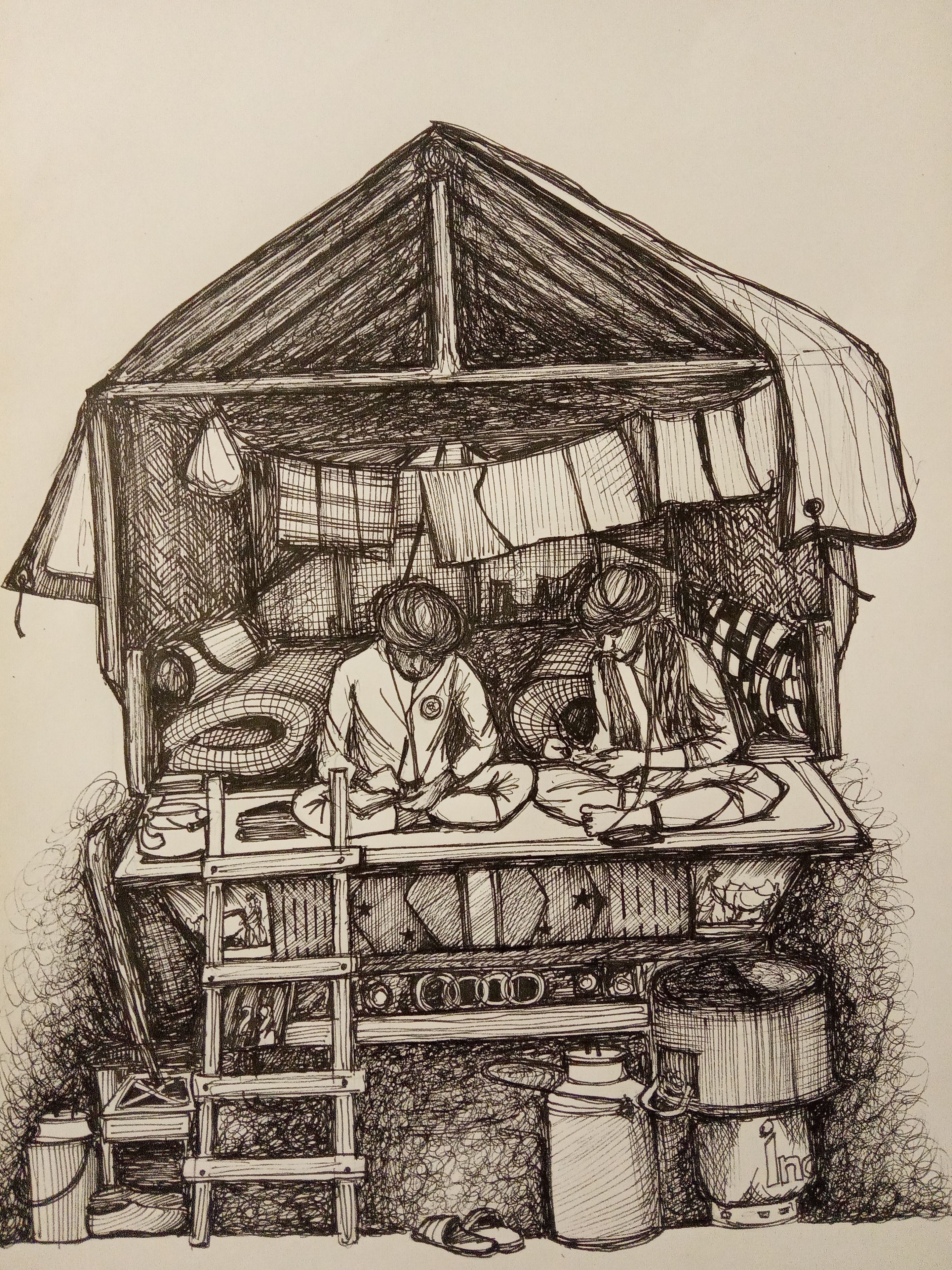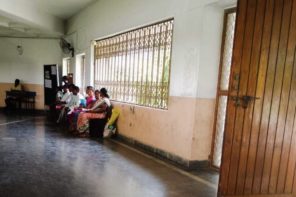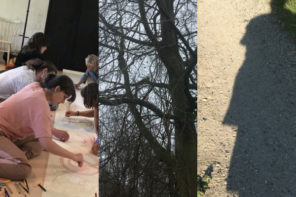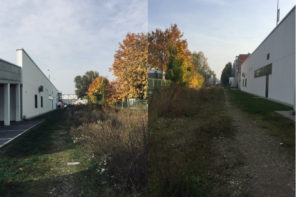Here’s yet another round of ethnographic slamming with contributions by Kristine Krause, Lex Kuiper, Marije de Groot, and Carola Tize. Still not sure what an ethnography slam is? The introduction explains it all. You should also check out the first and second installment of this fabulous thematic week!
It is what it is
by Kristine Krause
This is a love story.
It is about M,
a special woman who died when she was only 43.
It is about things we get in fieldwork
that we have not asked for.
It is what it is.
The first time ever I saw your face
I was seeking shelter
from the rain on North East London’s street in late November.
You sat quietly in the back of your shop,
your heavy eyelids half closed,
as if you were sleeping,
one of your round shoulders shifted out of your dress.
The regulars had opened the door for me.
I chitchatted with the men.
You were listening.
Later you just said:
Come back tomorrow, I will have a lot for you.
I came back the next day
and you made me fix the Christmas decoration.
You always made me do things I did not expect to do.
Things I had not asked for.
Bringing your money to the bank,
sleeping in your bed next to you,
with a flouncy pink silk nighty from you.
Washing you, when you were very sick and dying.
I ate your food –
I am still hungry for it.
The cross crust of your jollof rise.
Your spicy stews,
the nutty taste of your okra soup,
grilled Tilapia with your special seasoning.
I came almost every day for almost a year.
If not, you would call me:
K, where are you, come, I am waiting for you.
Later, when I came back to London,
your shop was my first stop:
The place where I would leave my bag.
The place where I would wait for friends.
The place where I would eat.
Your place: my fieldwork home.
You were the special woman,
who took me in
and helped me getting my research going.
Every fieldworker has a story like this:
people who for whatever reason help us getting started.
These are strange love stories,
because we engage and follow,
and open up and hardly draw boundaries.
Because we are doing fieldwork
and fieldwork means we take what we get, —– or not?
You were also the woman
who got really sick
and did not tell anybody
until the cancer became monstrous.
It scared the hell out of me.
My research was on what people do when they are sick.
But this was too much.
Things I have not asked for:
The evening when you called me from the hospital
after your monstrous and smelling wound had started bleeding again
and you said: K, come and wash me.
The impossibility to not follow this request.
I knew you were dying.
It was early in the morning,
and I took your scented soaps and lotions
from your flat, where I had slept.
I went to the hospital.
There you were:
thin and fragile,
in pain,
with the big smelling wound.
We walked to the shower with a walker.
I helped you untie the hospital gown.
There it was.
I took the handle from the shower,
I took soap,
I took a flannel.
I felt the structure of the monstrous growth under my fingertips.
Dragon skin.
I soaped the gross growth.
For a moment
I had the feeling the smell was gone a little bit.
I washed you.
And the nights
that followed the night of your death:
you came to me.
I don’t believe in ghosts.
But I saw you.
Coming towards me
with this horrible wound
all over your front body
and your hands stretched out
towards me
Arrrgh!
Things I did not ask for:
A pink silk nighty,
food,
to wash you,
a ghost.
This is a love story.
It is about M,
a special woman who died when she was only 43.
it is about things we get in fieldwork
that we have not asked for.
It is what it is.

Photo courtesy of pixabay.com
Joshua
by Lex Kuiper
Who is Joshua? As I flipped through my fieldwork notes, this question kept popping up. Until recently, the answer was condensed into just these few lines:
Joshua is a man in his mid-thirties.
He lives with his family.
He uses heroin daily.
He started methadone therapy not long ago.
This had somehow become Joshua; a still life composed of age, housing situation, and substance consumption. Frozen in time he was easily captured in these dimensions.
In the text below, drafted for the Ethnography Slam, I wanted to do something that I then felt I could not do in my dissertation; that is, create a mosaic of Joshua that shows the complex temporalities at play and his deep, though often difficult, entanglement with other heroin users and his family.

Photo by bluesundrops (Flickr, CC BY 2.0).
Each tile in this mosaic is a window constructed from the words of others, from Joshua’s memories, from his persistence to hope while he kept being orientated toward his past, and from the love and gratefulness he expressed for his family.
None of these windows give us an answer to ‘Who is Joshua?’ They do not try to capture him. Instead, they capture fleeting moments in a web of time, place and possibility. I hope these outlooks portray Joshua as more than a still life.
Joshua
Joshua is a good guy, his brother-in-law tells me. He was a great altar server. He knew the Bible by heart. Really, he could recite from it. He has been in and out of rehabilitation nineteen times and still has not recovered. If he really wanted to and put his mind to it, he could recover but…
…
Joshua
Joshua and I are sitting at his family’s road-side restaurant. Two of his brothers are cooking in large pots and his mother is cutting vegetables in front of us.
He says: I went by [my heroin dealer], but he was not home […] It has become difficult to reach him lately. […] Now I can’t find him and it is difficult to get my goods. […]
Can’t you buy it somewhere else if you cannot find him?
I can buy from Angga, but Angga has become arrogant. Many people don’t like it that he shows off his status now. Also, it is more expensive while the quality is the same.
…
Joshua
I look at his mom, who is still cutting vegetables.
So your family knows you use, I ask.
Yes, they know… Poor mom, she still works here and gives me money.
Yeah, yesterday you got one million rupiah [from her] right? Can she afford that just with this food stall?
My mom gives it, but I already [cut my daily use by half]. But I need to buy new stuff.
…
Joshua
At home Joshua tells me: I truly want to change. My poor mother. And also, if my mother is not there anymore, how will my future be… And I am bored. My life is monotonous. Every day is the same: looking for heroin after waking up. My life has no goal. So I came up my own programme to become clean.
…
Joshua
My friend tells me, without a blink: they say Joshua got shot.
What? He got shot? Where did he get shot?
I don’t know, Lex, usually it is in the leg. Yeah, he is a repeated offender right? Or it is likely that he was already being followed by a police officer. Or maybe he wanted to flee.
…
Joshua
As I talk with Joshua, other methadone users wave their hands at me. ‘Get away from him,’ they signal. Zorro even calls me, saying I should come over… I signal that everything’s okay. But Eka comes over and sits behind me with his phone for no apparent reason. I think he wants to check whether Joshua wants my money. Joshua seems to be too much in his own thoughts to notice.
…
Joshua
Yesterday my mother asked: ‘When? When do you really want to stop?’ My poor mother…
When do you want to stop?
Well… later. I still take methadone here, but I bring a plastic bag. Yesterday they did not look, I immediately spit the methadone in the plastic bag. Joshua laughs.
I saw there is a sign now, they say there is someone who is often naughty [and therefore people need to swallow methadone in front of a nurse].
Joshua laughs. I don’t want to drink continuously, I don’t want to become their asset. I’m afraid I will get stuck. Many [users have become] like that. They order me to increase my methadone dosage, but I don’t want to…
Oh, [the clinic’s staff] order you to increase your dose?
Yes, they want me to increase it, but later I’ll end up being unable to leave.
…
Joshua
The most important thing is not to lose hope. If you lose hope you become lazy to live.
…
Joshua
Before heroin would be transparent, but now it’s dirty… But still we have an evil brain that will tell us to keep using it. And this is the effect. I used to have so many girls everywhere and now… I’ve to pay women for sex.
It’s a pity right, all my brothers are older than me, but I look the oldest. I’ve spent all my money and all my youth.
…
Joshua
On a cupboard in his family home many trophies with Joshua’s name are on display. On the wall, pictures of him and his motorcycle.
Sorry my house is so small, he says.
He points at a smiling image of himself.
Here my face is still great, right… Not yet destroyed by drugs. No infections had appeared yet.
The pictures display him on a motorcycle or standing with a trophy. He points at the girls holding the racing flags.
I would go clubbing with the women every night.
He points at other people:
This one died.
This one overdosed.
This one now has a store selling motorcycle parts.
This one became an entrepreneur.
They also used, everyone used. It was just that… they had it under control.
…
Joshua
Intuition and emotions in research
by Marije de Groot
After a week of writing and learning how to use different voices in text, how to deal with numbers and percentages, and discussing the translation of field notes into text, the moment was there for the ethnography slam. The ethnography slam turned out to give space to emotions that were developed during my fieldwork. One of my uncertainties while studying the wishes to die and desire for euthanasia of elderly people in the Netherlands, was about researching someone’s ideas and concerns for the future. This raised questions about what this talking about the future means. Will stories change, or maybe even disappear over time? Since you get closer to your fears or when you get closer to making a final decision, many people might change ideas, move their concerns a bit further forward or might come across other aspects of life that make all these thoughts less, or more, relevant. At certain moments, data can feel slippery or give the feeling of a fata morgana that disappears when you come close.
Where is the space in academic writing to deal with intuition and uncertainties? It’s not always easy or possible to integrate these feelings into your academic text or presentations, although they are interesting for debate. What do or can we do with them?
Emotions might influence our work, the way we write about our data, but also our – or my – own feelings during the writing process. This slam gave me the opportunity to be creative with my own intuitions and uncertainties, to become aware of their existence, to work with them, to give them space and to process them into text and performance.
Unexpectedly, all the emotions that were processed by the slam participants into beautiful and dynamic performances brought an intense explosion of energy. The event created motivation and the ability to deal with a large part of our work that is overshadowed in the daily academic life. It was an intense bonding experience too. Unfortunately, it is not possible to completely capture and translate these dynamical performances into written text, but below is my attempt to do so.
Studying the ‘will be’ and ‘might have’
If he will be very old and if his wife will have died. If they will not have been able to have children. If he will sit alone all goddamned day in a small rental apartment. If there will only be a few people left in the neighbourhood he lives in and if all these people will not be his type of people. If he will have the idea that other people start to forget that they are dealing with a person when dealing with him, and if he will suffer from loneliness. Then he would ask the GP for euthanasia.
He opens the door, walks back with his walker into the living room, sits down on his sofa and turns off the TV. The girl for whom he just opened the door is sitting on the couch next to him. He tries to listen to what the girl is saying, but he can’t hear her words and decides to start talking about what he wants to say: he wants to die, but doesn’t know how to die in a decent way. He stands up, walks with his walker to the table where all the paperwork for his euthanasia request is organized next to the book with pictures of his life. The girl is now sitting at the other side of the table. He tells the girl that he asked two doctors for euthanasia, but they both refused his request. They expected someone with terrible pain, which he does not have. But – as he explains to the girl – sitting alone, the whole goddamned day … Loneliness also hurts. He expects to lose his independency and to become dependent from care. This system of care provokes him to die in a less decent way, to use the old knife of his father. But he does not want to do this and hopes that, although the girl says that she only listens and can’t actually do anything for him, this story might change the law or influences the opinion of doctors. So he waits, uncertain about the time he should wait and what could happen.
He might have wanted euthanasia if he might have become so old and if his wife might have died years earlier. If he became lonely. He might have requested euthanasia with his GP and he might have said that in case he might stop eating and drinking he might also die. But he might have refused to do that. Without food it might have been okay, but without fluids perhaps not. He might have asked another doctor for help. They might have told him that he should stop taking his medication first. But not taking medications might have brought back his old pain that he had gotten the pills for, or he might have increased the risk to get a stroke. And for whom might he in that case have suffered for? And in case all of these things might have worked out in this way, he might still have the problem that he might have wanted to die, but didn’t know how to. And the chance that he might have used the old knife of his father might have become bigger. Which might also have been awful for the nurses who might have found out in the morning and might have to mop all the blood away.
This all might have happened if he would not have died in a natural way a few months later.
The Inevitable Effects of Divergence
by Carola Tize
The process of writing my dissertation has unexpectedly familiarized me with the entire emotional spectrum, and has simultaneously deepened my relationship with my computer, whom I have nicknamed Cesar. He carries my writing alter ego with an ironic twist; at times he appears as a dictator, commanding, demanding and relentless. Other times he has been kind, diplomatic and surprisingly willing to compromise in moments of contemplation.
While the field research suited my natural patterns as a social butterfly and networker, writing and sitting has been an unexpected journey of self-discovery, a relentless quest inward to find my own voice.
The question as I was starting to write was, ‘How can I write in a way to truly represent my voice and my style, while at the same time representing the voices of others?’
Gaining confidence in my style has been an ongoing process, and has yet to stabilize as part of my newly acquired academic identity. I am still discovering what it means to find a consistent flow and relay the potential millions of words, sentences and paragraphs that are jammed in the indefinable crevices of my brain.
Searching for ‘the’ representative voice and style, is not purely developing in relationship with my computer. Instead it has come to take shape as an ongoing process in reflection with others. The ethnographic writing workshop came at a time when I was fraught with self-doubt. I could say that I was blocked, and was riding the ebbs and flows of emotions that come with placing insecure words on a page that I myself did not envision completing. From one day to the next we were suddenly immersed in a space where we were able to share and explore writing voices, styles and simultaneously provide support in our mutual struggles to portray social worlds we observed as bystanders during a specific period in our lives. Shifting perspectives and voices allowed new ways of depicting ethnographic moments, which previously had seemed distant and lacking interconnection. It was in exchange that new ideas and words took shape.
The ethnographic slam became a platform for exploring creativity in our writing and presentation styles. We were engaged in team efforts, cooperation and laughter much needed in our lonely writing endeavors. We went far beyond our comfort zones and transitioned into a dynamic presentation process that moved everyone from laughter to tears to reflection.
The piece I decided to present was taken from observations of the school ethnography I conducted in Berlin-Neukölln, and focused on intergenerational processes and the role of youth agency in resisting or reiterating social vulnerabilities through the generations. This piece probably would not have come to find the light of day, if we had not pushed ourselves to think outside the box.

Photo by Miss Wetzel’s Art Class (Flickr, CC BY-SA 2.0).
Shut the door Amir!
The empty hallway is filled with anticipation. The grey stone floors seem to cave inward with years of heavy use. Tiny specs of grey decorative gradation give way to the naked cement in front of the funneled spaces, the most frequented centimeters that merge learning and imagined freedom. The yellow glim of artificial light obscures the untold stories and encounters formulated over decades. The combination of murky yellow and meaningless beige portrays walls of another era. Black streaks from the sole of sneakers and chipped paint signify human contact, at times obscured by indefinable substance clusters that forbid willing contact. Next to the door frame of the room number 8D a massive hole commemorates a moment of uncontrolled anger, yet to be repaired. Down the hall the rare absence of a disobedient student on the brown wall mounted bench marks a moment of serene rarity.
The door to 7B opens, a hand appears and beyond the orderly chaos of a math class becomes visible. “Shut the door Amir!” “But I’m done and I have to go to the bathroom” “Shut the door NOW!” The door closes and the voices lose clarity from the distance of the hallway.
The closed doors confine the boundaries of the fragile stillness, permeating no further than the peripheries designated by cement and wood. The cacophony of screams, laughter and the pushing of furniture only penetrate into the empty hall between spaces intended for learning.
The undeniable shrill voice of Lara, the teacher from 7A commands one of the students to get back to her seat. Her voice permeates even cement walls at a threatening pitch that demands obedience. A moment of calm before a shriek erupts with a sudden scuffling of furniture behind the door of 7A. The door flies open and Lara commands Omar in front of the door. “Sit and we’ll discuss after class!” Only a few minutes until the bell. Omar fidgets, goes back to door and decides to peek in and wave to his friends. “Omar, OUT!”
He becomes the sign of life in the dim hallway until less than a minute later the giggling and then scuffling of four feet becomes audible. Two girls appear, one holding the edge of her black headscarf, which had come undone. With full body weight she slams open the door to the girl’s bathroom and the two girls disappear inside.
Once again the hallway returns to the ever imminent stillness of anticipated chaos.
Featured image (cropped) by Dinuraj K (flickr, CC BY 2.0).












